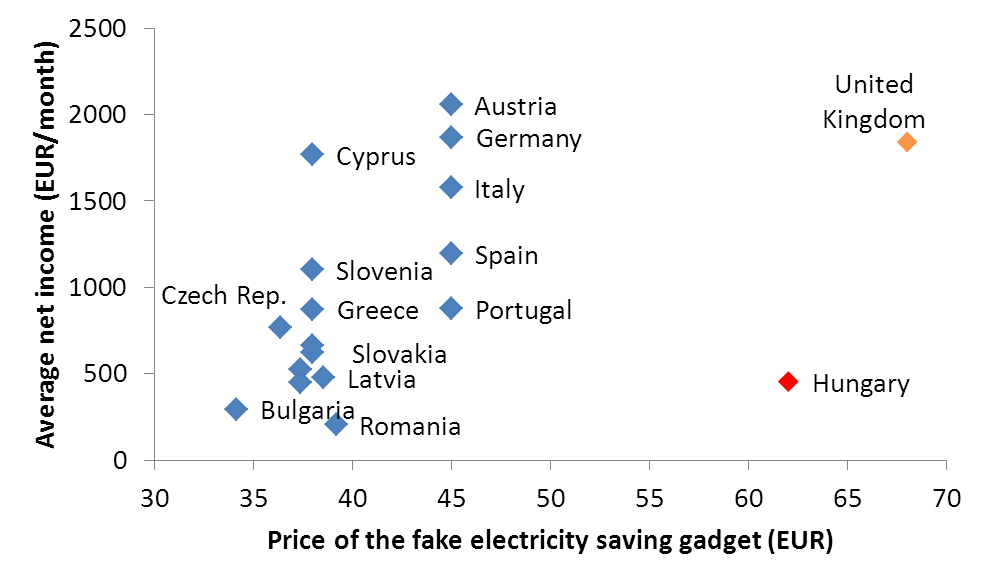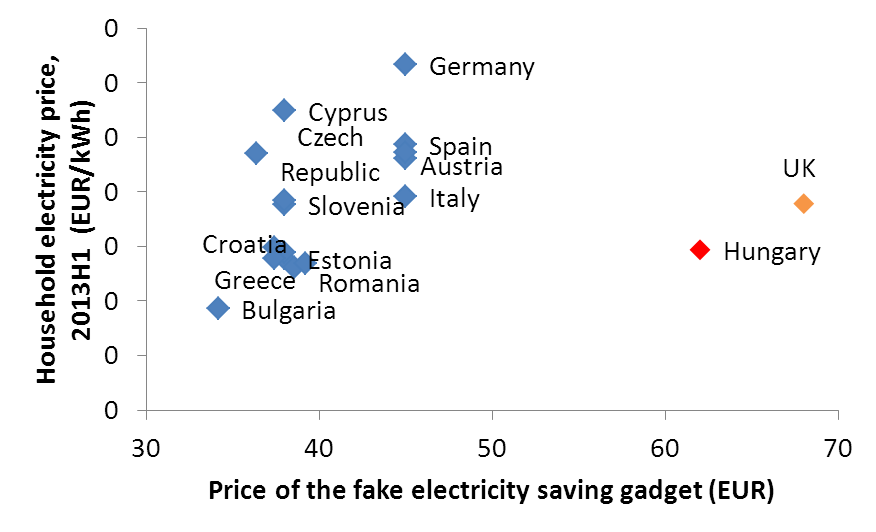A gadget which is supposed to decrease your electricity bills by 75%. Bullshit. Still, a recent EU-wide scam raises some interesting comparisons: where do they charge more for the same ‘product’?
Last week, we (as well as many others) got a Facebook ad: ‘If you buy our gadget, and simply plug it in an outlet, you can reduce your power consumption by up to 75%’.
 This is how the scam looks like. Source: energysaver-pro.com
This is how the scam looks like. Source: energysaver-pro.com
Of course it's nothing but a scam (others have also warned about it in Hungary). But there were some intriguing things about it.
You’ve just inherited a fortune: the economics of scams
First, it was not just a usual crappy scam, automatically translated into Hungarian by Google’s engine. As far as we could tell, they hired native speakers (or at least someone who speaks the language well) to translate the ‘documentation’.
Second, the site exists for most EU countries, from Greece to Great Britain. The Facebook ads could also cost a few bucks, more than usual spam.
Of course we cannot be sure about the ‘business model’ of the scammers, but it is certain that they want to earn money. The gadget is sold for 60 euros in Hungary. (I guess the gadget probably doesn’t cost much more than zero, and the delivery is likely to cost just a bit more than that...)
To make the whole ‘business’ profitable, you would need to fool more than just 1 or 2 completely dumb and naive people (like in the case of the classic Nigerian scam letters). You would probably need a couple of hundred of them around Europe. Then, price becomes an important parameter: if you charge too much, you might scare away potential buyers…
Let's see how much it costs in each country
What also caught our eye was the fact that the device does not cost the same in each country. Therefore we collected the data country by country. The only difference is the price tag of the product, all other terms of a deal (typical discount and free delivery) are identical.
What drives price differences? You can probably ask for more in countries where 1) wages are higher; 2) where electricity prices are higher so the ‘savings’ are higher; 3) where the locals are supposedly easier to fool. (Of course costs could also differ, but that is not that likely given the product is a fake.)
Here are the results. On the horizontal axis, we show the price of the fake gadget, on the vertical axis, the average incomes.
 Source: energysaver-pro.com, Eurostat
Source: energysaver-pro.com, Eurostat
Prices vary a lot: the gadget costs a ‘mere’ 35 euros in Bulgaria, and almost double that, 68 euros in Great Britain. In line with our prior guess, there is a weak relationship between the price of the gadget and incomes: indeed it costs somewhat more on average in wealthier countries. (We got very similar results when we plotted the gadget price against the price of electricity, see at the end of the post).
Hungarians and British are charged the highest price
Hungary and Britain are the odd ones out: the gadget costs much more there than elsewhere. The difference between the two is that when you compare it to the (high) average wage there, the British price is actually not that high. But in the case of Hungary (as well as in the case of Bulgaria and Romania) the price is also high compared to the average incomes.
Why do Hungarians and British have to pay so much? Is it because the scammers think they are easier to fool than other Europeans? Is it because of the fuss that surrounds household electricity bills in these countries? We will never know for sure. The scammers will never be identified, and the site will also probably disappear in a few months’ time.
Or are high Hungarian and British prices just some strange coincidence? Let’s hope that no one gets fooled…
Special thanks to Kristijan Rukavina for his help in collecting the data.
The other chart: the gadget price versus the electricity price. (It is not just a coincidence that this chart is very similar to the previous one: generally the household power price is higher in wealthier countries).
 Source: energysaver-pro.com, Eurostat
Source: energysaver-pro.com, Eurostat
A bejegyzés trackback címe:
Kommentek:
A hozzászólások a vonatkozó jogszabályok értelmében felhasználói tartalomnak minősülnek, értük a szolgáltatás technikai üzemeltetője semmilyen felelősséget nem vállal, azokat nem ellenőrzi. Kifogás esetén forduljon a blog szerkesztőjéhez. Részletek a Felhasználási feltételekben és az adatvédelmi tájékoztatóban.




